32 Foods High in Vitamin B12 to Keep You Energized
Also known as cobalamin, Vitamin B12 plays a vital role in many processes throughout the body. This essential vitamin is found in many fish, meats, and dairy products. Include many Vitamin B12 rich foods in your diet in order to make sure your body stays strong and healthy.

(https://www.agribusiness.com.pk/).
Mackerel
Several varieties of fish and other seafood are an excellent source of many vitamins and minerals. Mackerel is a great example: one fillet (a serving size that measures 88 grams) provides 16.72 micrograms of Vitamin B12. That’s more than enough to reach the daily recommended value for the average adult.
Serving Size (1 fillet, 88 grams), 16.72 micrograms of Vitamin B12 (279% DV), 231 calories.
Swiss Cheese
When enjoying a sandwich for lunch or as an after-work snack, add a slice of tasty Swiss cheese for an unexpected boost in several essential vitamins and minerals. Swiss cheese is a great source of calcium and Vitamin D. It also houses a moderate amount of Vitamin B12. One slice contains about 16% of the daily recommended value.
Serving Size (1 slice, or 1 ounce), 0.94 micrograms of Vitamin B12 (16% DV), 106 calories.
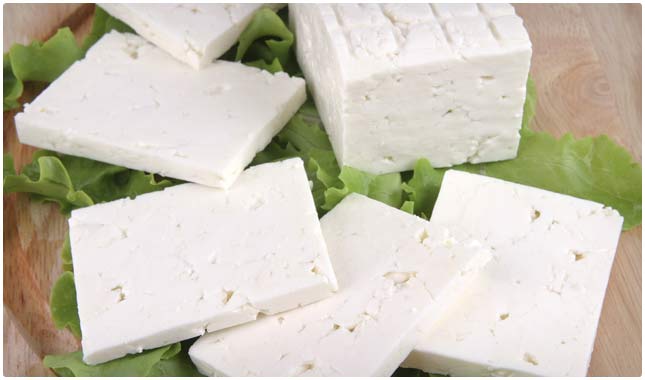
Feta Cheese
For a quick and healthy salad option, sprinkle some crumbled feta cheese over a dark green leafy salad with berries. One cup of crumbled feta provides 42% of the daily recommended value of Vitamin B12, and the fruits and veggies will provide your body with many other healthful minerals and antioxidants.
Serving Size (1 cup, crumbled), 2.54 micrograms of Vitamin B12 (42% DV), 396 calories.
Goose Liver Pate
Goose liver pate (also commonly referred to as the French pâté de Fois Gras) is a spread that includes a mixture of ground meat along with any of several base ingredients. Goose liver pate is rich in several vitamins, especially Vitamin B12. One tablespoon of goose liver pate contains an impressive 20% of the daily recommended value.
Serving Size (1 tablespoon), 1.22 micrograms of Vitamin B12 (20% DV), 60 calories.
Cured Ham
A serving size of three ounces of lean cured ham provides your body with just over a half of one microgram of Vitamin B12, or about 9% of the daily recommended value for the average adult. Like many meats, cured ham tends to be high in calories, so enjoy it in moderation as part of a healthy and balanced diet overall.
Serving Size (3 ounces), 0.55 micrograms of Vitamin B12 (9% DV), 123 calories.
Sardines
One can of sardines packed in oil (totaling 3.75 ounces) contains 8.22 micrograms of Vitamin B12. That’s more than enough to reach the daily recommended value. Sardines, like many varieties of fish, are also a good source of healthy omega-3 fats and bone nutrients such as calcium and Vitamin D.
Serving Size (3.75 ounces), 8.22 micrograms of Vitamin B12 (137% DV), 191 calories.
Emu Steak
Emu steaks are lean—nearly as lean as venison. A three-ounce portion of emu steak provides almost eight micrograms of Vitamin B12, or 133% of the daily recommended value. They also provide your body with protein, amino acids, and niacin. And because they’re so lean, emu steaks are relatively low in fat.
Serving Size (3 ounces), 7.96 micrograms of Vitamin B12 (133% DV), 131 calories.
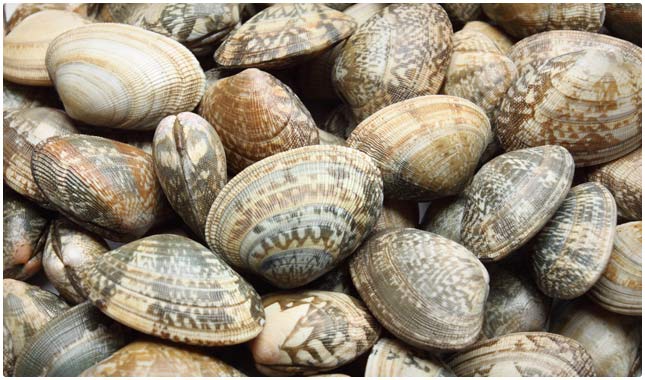
Clams
Ocean creatures are typically a great source of many vitamins and minerals, and clams are no different. Clam are filled with chromium (essential in regulating cholesterol levels), iron (a mineral that lets your body produce hemoglobin), and B vitamins. A single three-ounce serving of clams loads your body with Vitamin B12, giving you more than your fair share for the day.
Serving Size (3 ounces), 84.06 micrograms of Vitamin B12 (1401% DV), 126 calories.
Mozzarella Cheese
By adding a small amount of mozzarella cheese to your sandwich or salad, you’ll be contributing protein, calcium, and Vitamins A, D, E, and B12 to your diet. One slice of mozzarella cheese, or a serving size of one ounce, contributes 0.65 micrograms of Vitamin B12. That’s equal to about 11% of the daily value.
Serving Size (1 slice, 1 ounce), 0.65 micrograms of Vitamin B12 (11% DV), 85 calories.
Eggs
Whether you enjoy eating your eggs boiled, poached, scrambled, or fried, your body will enjoy absorbing the various vitamins and minerals housed inside the egg’s white and yolk. Eggs provide your body with riboflavin, folate, Vitamin D, protein, and Vitamin B12, all of which are essential in a healthy working body.
Serving Size (1 large), 0.56 micrograms of Vitamin B12 (9% DV), 78 calories.
Turkey Liver
After enjoying a turkey dinner at Thanksgiving, many people opt to keep the turkey giblets (including the liver) for use with other foods. The liver, in particular, is a great addition to stuffing or gravy. It brings a unique taste, along with several essential vitamins and minerals. A 100-gram liver provides over 800% of the recommended daily value of Vitamin B12, along with well over 1000% of the recommended daily value of Vitamin A.
Serving Size (100 grams), 49.4 micrograms of Vitamin B12 (823% DV), 228 calories.
Fortified Soymilk
Many people make the switch from whole or skim milk to soymilk once they learn of the many health benefits it can provide. Fortified soymilk is even better, as it brings added vitamins and minerals into your diet. One serving (100 grams) of fortified soymilk brings 19% of the daily recommended amount of B12. It’s also high in essential Vitamins A and D.
Serving Size (100 grams), 1.11 micrograms of Vitamin B12 (19% DV), 33 calories.
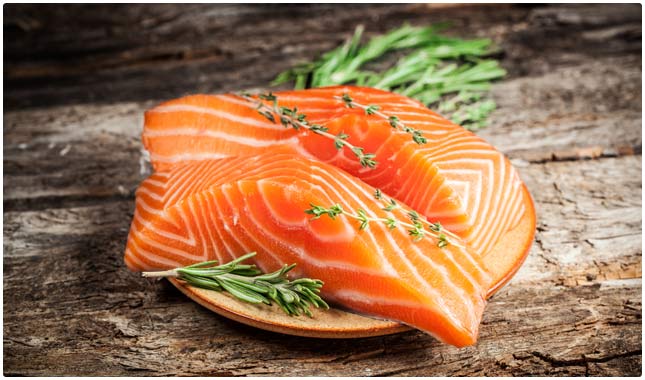
Salmon
Like many varieties of fish, salmon is high in healthy omega-3 fats, selenium, Vitamin D, and Vitamin B12. If you’re concerned about getting enough Vitamin B12, salmon is a healthful addition to your diet. A serving size of 100 grams contains over 300% of the amount of Vitamin B12 the average person must consume per day.
Serving Size (100 grams), 18.1 micrograms of Vitamin B12 (302% DV), 345 calories.
Gjetost Cheese
Gjetost cheese, which comes from Norway and is made using goat milk, goes by many names. However you refer to it, it’ll always be an excellent source of Vitamin B12. One package of gjetost cheese (or about eight ounces) contributes 92% of the recommended amount of Vitamin B12 the average adult should consume per day.
Serving Size (1 package, 8 ounces), 5.49 micrograms of Vitamin B12 (92% DV), 1058 calories.
Oysters
Oysters (not to be confused with clams) are a strong source of Vitamin B12. A serving size of 3 ounces provides 29.77 micrograms. That’s nearly 500% of the daily recommended value for the average adult. Oysters are also high in Vitamin A, thiamin, riboflavin, Vitamin C, and Vitamin D, all of which are essential to a strong and healthy body.
Serving Size (3 ounces), 29.77 micrograms of Vitamin B12 (496% DV), 116 calories.
Beef (Chuck)
Beef is a tasty meat that’s rich in Vitamin B12. The amount of Vitamin B12 varies depending on the cut. For the richest supply, choose lean fat-trimmed chuck, which contains 103% of the daily recommended value in a 100-gram serving. Beef is also a great source of iron, protein, and zinc.
Serving Size (100 grams), 6.18 micrograms of Vitamin B12 (103% DV), 212 calories.
Mussels
Mussels are a type of shellfish. To some, mussels are an acquired taste, but if you are able to eat them regularly, you’ll find that they’re rich with nutrients and vitamins, including B12. A three-ounce serving of mussels contains over twenty micrograms of Vitamin B12, or over 300% of the recommended daily value.
Serving Size (3 ounces), 20.4 micrograms of Vitamin B12 (340% DV), 146 calories.
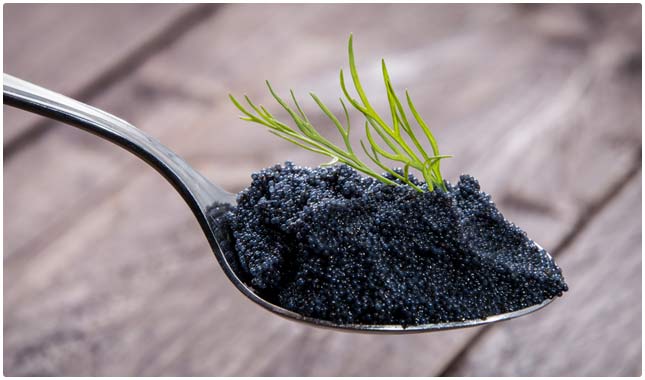
Caviar
If you think caviar is only for the rich and famous, think again. All types of caviar (fish eggs) are dense with nutrients that every single body needs. So start enjoying more caviar, and your body will start enjoying the many nutrients right away. Caviar is good for the immune system as it’s rich in Vitamins A, C, and E, and it’s also packed with zinc, iron, and Vitamin B12.
Serving Size (1 tablespoon), 3.2 micrograms of Vitamin B12 (53% DV), 40 calories.
Parmesan Cheese
Parmesan cheese is widely used as a final touch in dishes such as pasta, salads, pizza, and soups. It adds a subtle but delightful flavor to your meals, and it’s a surprising source of Vitamin B12. Just one tablespoon of parmesan cheese contains 2% of the amount the average adult should consume per day.
Serving Size (1 tablespoon), 0.11 micrograms of Vitamin B12 (2% DV), 22 calories.
Chicken
Poultry is commonly praised as a healthier alternative to red meat. Chicken is a good source of several essential vitamins and minerals, but it lacks much of the fat and calories that come with red meat. A 100-gram serving of chicken provides the body with 7% of the daily recommended amount of Vitamin B12. Many people also eat chicken for its protein, selenium, and Vitamin B3 (niacin) contents.
Serving Size (100 grams), 0.43 micrograms of Vitamin B12 (7% DV), 214 calories.
New England Clam Chowder
New England clam chowder is a thick, milk- or cream-based chowder that typically incorporates potatoes, onions, and clams, along with herbs and spices for flavoring. The clams help make this dish a viable source of Vitamin B12; one cup contains 12.1 micrograms, which is just over 200% of the daily recommended value.
Serving Size (1 cup), 12.1 micrograms of Vitamin B12 (202% DV), 154 calories.
Fortified Cereal
Fortified whole grain cereals are a great way to start a healthy day. Three-quarters of a cup of fortified cereal, equal to about 30 grams, contains up to six micrograms of Vitamin B12. That’s just enough to meet your daily quota in one fell swoop. Different brands and types of cereal vary widely, so check the nutrition labels for exact amounts.
Serving Size (3/4 cup, 30 grams), 6 micrograms of Vitamin B12 (100% DV), 100 calories.
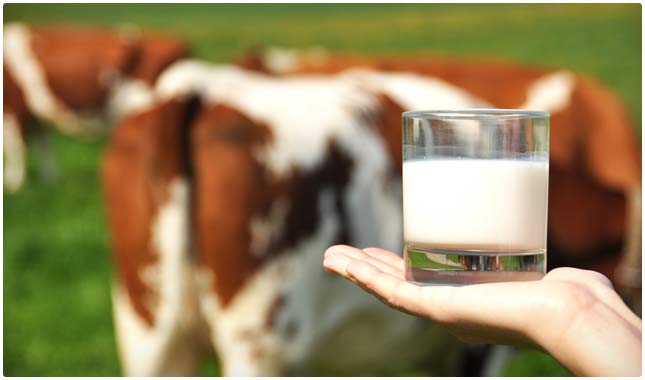
Whole Milk
Most people who drink whole milk do so for the calcium and Vitamin D. But whole milk is also a good source of other vitamins and minerals, including essential B vitamins. One cup of whole milk contains over one microgram of Vitamin B12, enough to fulfill 18% of the daily recommended total.
Serving Size (1 cup), 1.07 micrograms of Vitamin B12 (18% DV), 146 calories.
Low-Fat Buttermilk
Buttermilk is often used in baked goods, smoothies, ice cream, salad dressings, soups, and various chicken and pasta dishes. Many people use it, but few realize the many nutritional elements it can add to your diet. For example, low-fat buttermilk is a good source of Vitamin B12, providing about 9% of the average person’s daily needs in a one-cup serving.
Serving Size (1 cup), 0.54 micrograms of Vitamin B12 (9% DV), 98 calories.
Octopus
Octopus isn’t generally a common dish in much of the world, but when it’s enjoyed in soups, stews, gumbos, and salad dishes, it’s a tasty treat and an excellent source of many minerals and vitamins. Three ounces of octopus contains 30.6 micrograms of Vitamin B12, over 500% of the daily recommended value. It’s also high in protein, iron, and zinc.
Serving Size (3 ounces), 30.6 micrograms of Vitamin B12 (510% DV), 139 calories.
Crab
Crab meat is a popular type of seafood, often enjoyed on special occasions. Whatever the occasion, though, it’s a great source of zinc, copper, selenium, and potassium. It’s also high in B vitamins. A 100-gram serving of crab meat provides 6.59 micrograms of Vitamin B12, just over the daily recommended value.
Serving Size (100 grams), 6.59 micrograms of Vitamin B12 (110% DV), 97 calories.
Yeast Extract Spread
Yeast extract spread (also called marmite) is often enjoyed over toast, in sandwiches, or spread over crackers. It has a strong salty flavor, so remember that a little goes a long way. A teaspoon of this savory spread contains about 1% of the necessary amount of B12 for the day. Enjoy it with snacks or meals to get a small boost to your vitamin intake.
Serving Size (1 teaspoon), 0.03 micrograms of Vitamin B12 (1% DV), 9 calories.

Tuna
Tuna is a good source of many healthful nutrients, especially selenium, potassium, Vitamin D, Vitamin A, Vitamin B12, and omega-3 fats (the good kind of fat). For essential B12, a serving size of 100 grams of tuna fish provides 2.2 micrograms. That’s 37% of the daily recommended value for the average adult.
Serving Size (100 grams), 2.2 micrograms of Vitamin B12 (37% DV), 198 calories.
Liverwurst Sausage
One slice of liverwurst, which makes a great addition to a lunchtime or after-work sandwich, contains 2.42 micrograms of Vitamin B12, or about 40% of what the average adult needs per day. But like other meats you’ll find at the deli, it’s a little steep on the calories and sodium, so enjoy it in moderation.
Serving Size (1 slice), 2.42 micrograms of Vitamin B12 (40% DV), 59 calories.
Fortified Tofu
Tofu is often fortified with essential vitamins, making it a healthy food option and a great way to supplement your diet with many healthy nutrients. One quarter of a package of fortified tofu (or 79 grams) contains about 31% of the daily recommended value of Vitamin B12. Fortified tofu is also a great source of protein, calcium, and Vitamin D.
Serving Size (79 grams), 1.86 micrograms of Vitamin B12 (31% DV), 43 calories.
Whey Powder
Whey powder is a common food additive and nutritional supplement that comes from milk. It’s often used in baked goods, processed cheeses, and more. One tablespoon of whey powder contains about 1.9 micrograms of Vitamin B12, or enough to account for about 3% of the recommended value for the day.
Serving Size (1 tablespoon), 0.19 micrograms of Vitamin B12 (3% DV), 28 calories.
Non-Fat Yogurt
Choose yogurt for a healthy snack that won’t weight you down. Eating just one cup of non-fat plain yogurt provides almost one and a half micrograms of Vitamin B12, or about a quarter of the recommended daily amount for the average adult. Yogurt is also a good source of calcium, potassium, and Vitamin D.
Serving Size (1 cup), 1.49 micrograms of Vitamin B12 (25% DV), 137 calories.
A Vitamin B12 deficiency may be marked by such symptoms as anemia, weakness, pale skin, weight loss, or upset stomach. Being deficient in this essential vitamin can affect many major aspects of your health, so be sure to enjoy a Vitamin B12 rich diet every day in order to say strong and healthy.
Make sure you like Bembu on Facebook to be updated everytime we post new tips on ways to live & eat healthier.
Vitamin B12 FAQ
Does Vitamin B12 give you energy?
The group of B vitamins is known for increased levels of energy, and B12 is an important part of this makeup. You don’t want to miss out on it, but there’s no reason to overload your system with it either. What you’re looking for is consistent and sustained levels of the proper amount.
Is Vitamin B12 safe?
As long as you are getting it from natural sources, and are getting it in the amounts that your body needs, it is safe. If you are taking large doses of it in supplement form, or taking synthetic vitamins, there are reported side effects to it.
Does Vitamin B12 cause headaches?
Anecdotal evidence suggests that taking Vitamin B12 supplements may cause headaches, including migraines. That’s why it’s a good idea to only increase your levels by eating foods rich in this vitamin, since there are no reported side effects this way.
Is Vitamin B12 vegan?
Many of the sources of Vitamin B12 are not vegan, but there are plenty that are. Just because you are following the vegan lifestyle does not mean you have to be short on Vitamin B12. Here are some vegan options for you to consider: fortified soy milk, fortified cereal, fortified tofu, and yeast extract spread.
Does Vitamin B12 make your pee yellow?
It’s interesting to note that when you take a Vitamin B complex your pee will turn a bright yellow. When you get your B12 from natural sources, like in the food you eat, this effect does not occur.
Can Vitamin B12 be stored in the body?
Yes, although there is some contradictory information out there, the general consensus is that the body is able to store Vitamin B12 in the liver. One university says that because the B vitamins are all water soluble there’s no way for the body to store them. But several other sources say that it is possible for the body to store them, which is why vegetarians and vegans do not show signs of a shortage long after stopping their intake of foods containing B12.
Does Vitamin B12 keep you awake?
You might notice that by upping your B Vitamins you are more awake and alert at times when you’re trying to sleep. This is one of the side effects of taking Vitamin B supplements, which is why it’s always good to get them from the foods you eat rather than in large doses in supplement form.
Is Vitamin B12 good for memory?
Running short on Vitamin B12 may cause you to have problems remembering things, so conversely, adequate levels should help you to keep your current abilities. If you are looking for ways to improve your brain and memory check out our full report on that.
Does Vitamin B12 help with anemia?
It helps to prevent a certain type of anemia called megaloblastic anemia, but not the most common type of anemia caused by iron deficiency. This has caused quite a bit of confusion for those suffering from the general type of anemia, as increasing amounts of B12 will only be effective for that specific type.
Is Vitamin B12 a blood thinner?
It is a possibility that B12 may be responsible for thinning the blood. It’s always good to have your levels checked out by a doctor before starting any blood thinning medication.
Does Vitamin B12 make you happy?
It has been shown to help treat and prevent depression, and the B vitamins in general are often associated with feeling happier and more optimistic. Contrarily if you are running a deficiency you might be more prone to sad thoughts and clinical depression.
Can I take too much Vitamin B12?
It’s quite possible that you might take too much Vitamin B12, especially if you are already topped off and are taking a Vitamin B complex in synthetic form or through a supplement. This likely won’t be a toxic event for you, but it’s not something you want to get into the habit of doing.
Does Vitamin B12 cause constipation?
No, but running a shortage of it may cause constipation.
Is Vitamin B12 folic acid?
No, folate is also known as Vitamin B-9, but the two are very closely related, and Vitamin B-12 plays a part in how well your body absorbs folate.
Does Vitamin B12 help acne?
It’s been known to be good for the skin in general, and has been said to help prevent the occurrence of acne.
